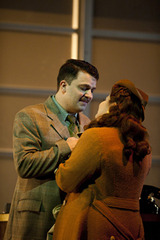| Opera Reviews | 28 April 2024 |
Orlando gets a clever updatingby Catriona Graham |
|
| Handel: Orlando Scottish Opera March 2011 |
|
|
A revolving set, showing a single storey utility building, with one long wall of opaque glass panels, serves for several rooms in a hospital. The glass panels provide a screen for the back projection of thoughts in Orlando's tortured mind. The doctor, Zoroastro (Andreas Wolf) is trying to restore him to fighting condition, while his beloved Angelica (Sally Silver) has fallen in love with Medoro (Andrew Radley) who loves her back but is, in turn, loved by the nurse Dorinda (Claire Booth). Actually, Dorinda is the sanest one of the lot and certainly gets most of the best lines in this translation by Andrew Jones, adapted by director Harry Fehr. Her voice is warm and expressive, particularly the sobbing in her first Act II aria, her acting lively and utterly convincing. Mead is excellent. When he has really lost it, and has pounced on the female doctor, pinning her to the ground, his fading falling chromatic line is gorgeous. In his locked room, he initially expresses love to Dorinda before showing in no uncertain terms that he is totally doolally; his aria 'My eyelids grow drowsy' is beautifully pitched and is followed by a distinct silence in the audience. The shock (for the audience as well) of the ECT is followed by a bright, upbeat, outwardly recovered Orlando, ready to resume the fight. Angelica does nothing to help Orlando - rather, there's a good argument that it's her behaviour which tips him over the edge, particularly in a teasing aria with continuo. Once she has paired up with Medoro, they patronise Dorinda in the most shameless way - full marks for restraint; the audience wouldn't be surprised if she smacked them. Scottish Opera continues to explore the many ways of portraying smoking onstage without breaking the smoking ban - Angelica sings of her heart being on fire when the lighter most emphatically is not. Her next aria, about friendly woodland and verdant meadows, is accompanied by two accomplished recorders - Richard Blake and John Hall - while she goes through a trunk of furs. Diction throughout is clear and distinct, Wolf's clarity compensating for an initial softness in his lowest notes, where he might have been overwhelmed by the orchestra. However, his voice warmed up through the performance. Silver gained a sweetness, particularly in Act II. Radley sings with fervour, even when spouting the most fearful tosh to poor Dorinda. Designer Yannis Thavoris has caught the 1940s well - the décor still shiny and new, the tea trolley for the staff and patients, the nurses' uniforms including the red-lined capes. Rebecca Atkinson-Lord's choreography is excellent - the medical staff circling a suicidal Orlando, trying to separate him as he tries to throttle one of their colleagues. Six hardworking non-singing actors provide nursing and medical colleagues, patients, orderlies. Without them - Paul Aitken, Lindsay Barr, Ruth Granton, Laura Manderson, Ian Petrie and Hannah Taylor - the production would not work. The orchestral playing, conducted by Paul Goodwin, makes one wonder why this score is not better known. |
|
| Text ©
Catriona Graham Photo © Richard Campbell |

 Over the centuries, Ariosto's Orlando Furioso has been reworked
in many ways. Setting Handel's version of it in London in 1940 is perhaps
not the obvious thing to do, but it works better than might have been
expected. Scottish Opera's production casts Orlando (Tim Mead) as an
RAF pilot who is clearly off his trolley - we first see him getting
an early brain-scan - but it is love, not shell-shock, which has brought
him to this state.
Over the centuries, Ariosto's Orlando Furioso has been reworked
in many ways. Setting Handel's version of it in London in 1940 is perhaps
not the obvious thing to do, but it works better than might have been
expected. Scottish Opera's production casts Orlando (Tim Mead) as an
RAF pilot who is clearly off his trolley - we first see him getting
an early brain-scan - but it is love, not shell-shock, which has brought
him to this state. 





